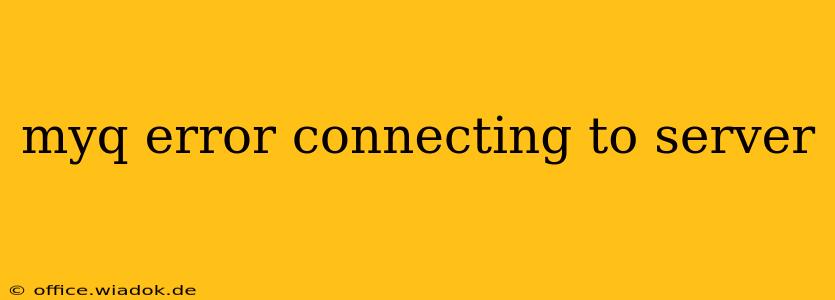Encountering a "MySQL error connecting to server" message can be incredibly frustrating, halting your database interactions and potentially impacting your entire application. This comprehensive guide will walk you through common causes and effective troubleshooting steps to get you back online quickly. We'll cover everything from simple configuration checks to more advanced solutions, ensuring you can identify and resolve the issue efficiently.
Common Causes of MySQL Connection Errors
Several factors can prevent a successful connection to your MySQL server. Let's explore some of the most frequent culprits:
1. Incorrect Hostname or IP Address:
-
Problem: The most basic issue is specifying the wrong hostname or IP address when attempting to connect. Double-check your connection string for accuracy. Are you using
localhost, a specific IP address, or a domain name? Ensure this matches the server's actual address. -
Solution: Verify the server's hostname or IP address. Use the correct value in your connection parameters.
2. Wrong Port Number:
-
Problem: MySQL typically runs on port 3306. However, this can be changed during installation or configuration. If you're using a non-standard port, you must specify it in your connection string.
-
Solution: Confirm the MySQL port number used by your server. Adjust your connection string accordingly. You might need to check your MySQL configuration file (
my.cnformy.ini) for theportdirective.
3. Incorrect Username or Password:
-
Problem: A simple typo or an outdated password can prevent authentication.
-
Solution: Verify your MySQL username and password. Use the correct credentials. If you've forgotten your password, consult your MySQL documentation on password recovery procedures. Never share your MySQL root password indiscriminately.
4. Firewall Issues:
-
Problem: Your system's firewall or a network firewall might be blocking connections to the MySQL server.
-
Solution: Temporarily disable your firewall to see if that resolves the issue. If it does, configure your firewall to allow connections to the MySQL port (typically 3306). Ensure that the firewall rules are correctly configured for both inbound and outbound traffic depending on your network configuration.
5. MySQL Server Not Running:
-
Problem: The most obvious reason—the MySQL server might not be running on the target machine.
-
Solution: Check the status of the MySQL server using the appropriate command for your operating system (e.g.,
systemctl status mysqlon Linux systems). If it's not running, start the server using the appropriate command (e.g.,systemctl start mysql).
6. Incorrect Socket Location:
-
Problem: The connection string might point to an incorrect socket file location, particularly if you're connecting locally.
-
Solution: Review your MySQL configuration file (
my.cnformy.ini) to identify the correct socket path. Update your connection string to use this path.
7. Permission Issues:
-
Problem: The MySQL user account might lack the necessary privileges to connect.
-
Solution: Use a user account with appropriate permissions. Check the user grants using the
SHOW GRANTS FOR 'your_username'@'your_hostname';command in the MySQL client. If necessary, grant the required privileges to the user.
Advanced Troubleshooting Steps:
If the basic steps haven't resolved the issue, consider these more advanced options:
-
Check MySQL Error Logs: Examine the MySQL error log for more detailed information on the connection failure. The location of the error log varies depending on the operating system and MySQL configuration.
-
Network Connectivity: If connecting remotely, ensure network connectivity between your client machine and the MySQL server. Use tools like
pingortracerouteto diagnose network issues. -
Database Corruption: In rare cases, database corruption can prevent connections. You might need to repair the database using MySQL's repair tools. This is a last resort and requires careful consideration and backups.
Preventing Future Connection Errors
Proactive measures can minimize the risk of future connection problems:
-
Regularly Back Up Your Database: This protects your data and allows for easier recovery in case of corruption or accidental deletion.
-
Monitor MySQL Server Status: Regularly monitor the server's health and performance to identify and address potential problems before they escalate.
-
Keep MySQL Updated: Regularly update your MySQL installation to benefit from bug fixes and security patches.
By systematically investigating these potential causes and solutions, you should be able to resolve your MySQL connection issues and regain access to your database. Remember to always prioritize data security and maintain regular backups.

